2018年人教版新目标初二英语Unit 1 What's the matter 全单元教案
2018年秋人教新目标版八年级上册英语 Unit 1 备课综合(教案+课时作业+课件+单元测试 (14)

第三课时Section B (1a-1e)基础知识回顾Ⅰ.根据首字母及汉语提示补全单词1.Food is cheap(便宜的) in that market.2.The weather in the mountains was terrible(糟糕的).3.I saw an interesting(有趣的) movie last night.4.The things in that store were really expensive(昂贵的).5.He cooked something delicious(美味的) for me.Ⅱ.根据句意用所给词的适当形式填空st Sunday my brother and I went(go)swimming.2.I often do(do) my homework after dinner,but yesterday I watched(watch) TV.3.The young man turned off the lights and then left(leave).4.Mike didn’t go(not go) to bed until 12 o’clock last night.5.Why did you walk(walk) to school last Monday?综合能力提升Ⅰ.单项填空(C)1.—Did you enjoy yourself on vacation?—.I had a lot of fun.A.Yes,we didB.No,we didn’tC.Yes,I didD.No,I didn’t(B)2.—was the weather like there?—It was rainy.A.HowB.WhatC.What aboutD.How about(B)3.What you every weekend when you were in Grade Two?A.will;doB.did;doC.do;doD.are;doing(A)4.They some dumplings supper last night.A.had;forB.have;forC.had;onD.have;in(B)5.I looked up and something special in the sky.A.seeB.sawC.lookD.lookedⅡ.阅读理解Last winter,I went to Moscow myself.My children worried about me a lot.I was in my 70s.But I still wanted to have a vacation in Moscow.It’s my dream place.I flew there.It was really cold in Moscow.I waited for the bus with my heavy bag.At that time,a man came to me.“May I help you?” he asked.“Yes,thank you,” I said.“Is it OK to help me?I think you are busy making money.” He seemed a taxi driver.“It’s OK.I like helping old people.Hope you have a good time in Moscow,” he said.I couldn’t say anything.I met a good Russian.His English was not good,but we had a great talk on the way to the hotel.When we arrived,I thanked him again and gave him some money.But he didn’t take.“I helped you not for money.I just hope my mom can get help someday,” he said and went away.That’s why I love traveling(旅行).I enjoy visiting beautiful places and meeting kind people.(B)st year,the writer went on a trip to.A.ChinaB.RussiaC.AustraliaD.America(B)2.The writer’s family felt when she went on a trip.A.interestedB.worriedC.boredD.happy(D)3.The writer went there.A.by carB.by busC.by taxiD.by plane(D)4.Why did the man help the writer?A.To make money.B.To make friends.C.To have a great talk.D.To hope someone can help his mom one day.(A)5.What’s the best title for the passage?A.Cold weather,warm heart(心)B.Moscow,a beautiful cityC.It’s never too old to travelD.Little things make a big difference。
2018年人教版新目标初二英语Unit 1 What's the matter 全单元教案
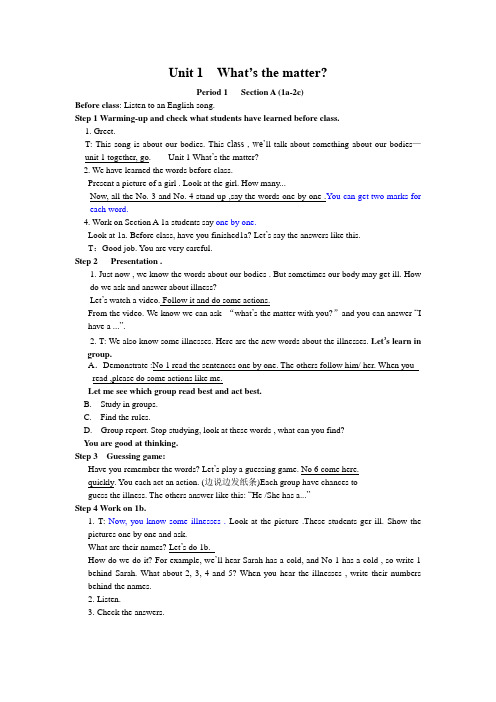
Unit 1 What’s the matter?Period 1 Section A (1a-2c)Before class: Listen to an English song.Step 1 Warming-up and check what students have learned before class.1. Greet.T: This song is about our bodies. This class , we‟ll talk about something about our bodies—unit 1 together, go. Unit 1 What‟s the matter?2. We have learned the words before class.Present a picture of a girl . Look at the girl. How many...Now, all the No. 3 and No. 4 stand up ,say the words one by one .You can get two marks for each word.4. Work on Section A 1a students say one by one.Look at 1a. Before class, have you finished1a? Let‟s say the answers like this.T:Good job. You are very careful.Step 2 Presentation .1. Just now , we know the words about our bodies . But sometimes our body may get ill. Howdo we ask and answer about illness?Let‟s watch a video. Follow it and do some actions.From the video. We know we can ask “what‟s the matter with you?”and you can answer “I have a ...”.2.T: We also know some illnesses. Here are the new words about the illnesses. Let’s learn ingroup.A.Demonstrate :No 1 read the sentences one by one. The others follow him/ her. When you read ,please do some actions like me.Let me see which group read best and act best.B. Study in groups.C. Find the rules.D. Group report. Stop studying, look at these words , what can you find?You are good at thinking.Step 3 Guessing game:Have you remember the words? Let‟s play a guessing game. No 6 come here.quickly. You each act an action. (边说边发纸条)Each group have chances toguess the illness. The others answer like this: “He /She has a...”Step 4 Work on 1b.1. T: Now, you know some illnesses . Look at the picture .These students ger ill. Show thepictures one by one and ask.What are their names? Let‟s do 1b.How do we do it? For example, we‟ll hear Sarah has a cold, and No 1 has a cold , so write 1 behind Sarah. What about 2, 3, 4 and 5? When you hear the illnesses , write their numbers behind the names.2. Listen.3. Check the answers.Step 5 Group work.1. T: Why do they get ill? Look at the chart, match the reasons with the illnesses.2. Check the answers.3. Demonstrate .Look at the chart. Let‟s talk about their illnesses in pairs. Here is the example.Boys ask , girls answer.4. Look at the chart and make more similar conversations.When you talk , please talk loudly, correctly and politely, please do some actions and use the nice intonations.5. Let students show their conversations.Step 6 Work on 2a and 2b.1. T: David has a stomachache, what should he do?Show the pictures ,ask and answer. 板书What should …do? …should….T: Your advice is very useful. Let‟s learn more advice from 2a and 2b.2. Listen, finish 2a. What‟s the matter with the people? What advice do they get?3. First , guess the answers to 2b. Then listen and check the answers.OK, you have good listening skills.Step 7 Group work.The advice for illness is very useful . It can help us take good care of ourselves and others.T: If some students are ill, will you give some advice and help them? let‟s act andmake conversations. Let me see who is the kind person? How do we talk?Look at the example.2. Show the example.When you talk , please talk loudly, correctly and politely, please do some actions and use the nice intonations.3. Students work.4. Let students show their conversations.Step 8 Summarize and homework:Period 2 Section A 2d,GrammarKnowledge aims:1. The students will be able to learn the words and phrases: take breaks, hurt,2.Summarize the grammar and practice them.3. Target Language:①What‟s the matter with Ben? –He hurt himself./ He has a sore back.②-Do you have a fever? -Yes, I do./ No, I don‟t.③-Does he have a toothache? -Yes, he does.④You shouldn‟t eat so much next time.⑤What should she do?⑥She should take her temperature.⑦-Should I put some medicine on it? -Yes, you should. / No, you shouldn‟t.Structure: ①“should/ shouldn‟t + verb” for suggestion ②Reflexive pronouns. Ability Object:1.Enable students to talk more about health.2.Learn to give others some advice according to their matters.3.Enable the students to do things using the target language and the grammar. Emotion Object:1.Learn to live in a healthy way.2. Learn to take care of others and themselves.Teaching Key Points:1. How to teach the Ss to learn the names of the illness: toothache, fever andheadache.2. How to give others some advice according to their matters.3. The grammar.Teaching Difficult Points:1.How to give advice using should.2. Use the grammar to do things.Teaching Procedures:Step 1 Review.1. Free-talk. What …s the weather like today? If you don‟t wear warm clothes,what will happen?2.Show the pictures and say.He / She has_______________. He /She should___________.Step 2 Work on 2d.1. Game.Do in the same way2. Listen to the conversation and answer my questions .1). What's the matter with Lisa?2). What did Lisa do on the weekend?3). What should Lisa do ?3. Role-play the conversation.First, have students to role-play the conversation in 2d in groups and choose the best.Step 3 Group work.1. Give more examples. Have students read the conversation in 4c.2. and then ask them to work in groups. One student mimes a problem. The otherstudents in his/ her group guess the problem and give their advice.Step 4 Grammar Focus .Have students to read and remember the sentences of Grammar Focus by themselves, and then have them work in groups to sum up how to talk about health problems and give right advice.Step5 Work on 4a.Ask students to go through each conversation in 4a quickly, and then complete the conversations individually. Move around the classroom and help them ifnecessary.Check the answers.Ask some students to practice every conversation in pairs.Step 6 Work on 4b.Have students choose and circle best advice for the health problems in 4b. Then ask students add their own advice about these health problems.Have some students to report their own advice in class.Step 7 Summary.Health problems and give right advice.Ask one or two students to sum up the key phrases in the passage, and help them to make up more sentences with them.Step 8 Homework .Have students make up conversations to talk about sb.‟s health problems and give them some advice.Period 3 Section A 3aKnowledge aims:The students will be able to learn the words and phrases: passenger, get off, to one‟s surprise, onto, trouble, hit, right away, get into.2.The students will be able to use the expressions:The driver didn‟t think about thinking about himself. He only thought about saving a life. Ability aims:The students can understand the passage.2.To train the students‟ cooperation with their partners.Emotional aims:To train the students to care about others and help others who are on trouble..Teaching important points:The students can understand the passage and use the useful expressions freely.Teaching difficult points:The students can learn from the drivers and do as the driver does if possible.Teaching procedures:Step 1 Warming-up and lead-in.1. Watch a video.2. What is the short sketch about?3.Look at the picture. What can you see? Can you guess what is happening?Step 2 Preparing reading.1. Guess the main idea.What is this passage mainly about?Strategy : The title and pictures can be helpful to understand the text.Title may be the main meaning of the article.2. Read the passage. Do you think it comes from a newspaper or a book?Step 3 While-reading.1.Find the topic sentence(中心句)of each paragraph.1). At 9:00 a.m. yesterday, bus No. 26 was going along Zhanghua Road when the driver sawan old man lying on the side of the road.2). Some passengers helped Mr. Wang to move the man onto the bus.3). Thanks to Mr. Wang and the passengers, the doctors saved the man in time.2. Which sentences touched you? Read them in the way that you like.Step 4 Post-reading.1. Praise the persons.What a great person the driver was!He stopped the bus without thinking twice, when he saw an old man lying on the side of the road.What _______ the _____ was/were!2. Work on 3bAfter checking the answers, have Ss scan the passage and check (√) the things that happened in the story.3. Work on 3c.T: Ask the students to discuss the questions in pairs.Step5 Homework.1. If you are the driver, write a diary about what happened yesterday.2. If you are the passenger, write a diary about what happened yesterday.3. Act the story out in your group.4. Read some messages about good men.Period 4 Section B 1a-1dStep 1 Lead –in and learn the new words.It‟s a beautiful song, I like it very much. Let‟s learn the new words.1. Who can be the teacher? One student teach one word.2. Let’s sing and remember the new words.The teacher teaches to sing, ask some group to sing. Finally sing together.(可以课前教唱,。
初二英语(人教版)-Unit 1 What's the matter?Period 1-1教案
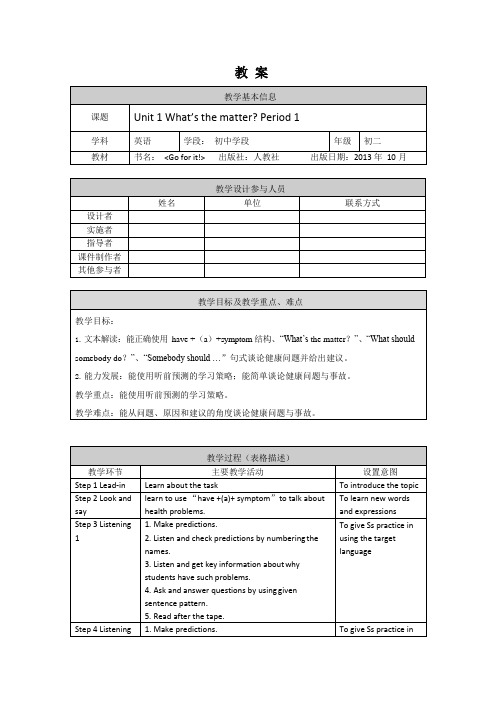
listening for specific information
Step 5 Look and
say
Talk about advice on some common health
problems by sentence.
To expand target
3
1.Read the health problems and findkeywords or body parts in thesentences.
2.Listen and find the rightinformation.
3.Readthroughthelistoftreatmentsandget underlinekeywords.
language
Step6 Practice
1.Review healthproblems.
2.Putstepsoftreatmentsinorderbyusinglinking words.
To enlighten Ss with medical knowledge
Step 7 Listening
4.Find the treatment of eachproblem.
5.Retell and give asample
To give Ss practice in using the target language
Step 8 Liwerquestions.
Step 4 Listening
1. Make predictions.
To give Ss practice in
2
2.Listen and check predictions by numberingthe pictures.
2018人教版新目标初二英语下册Unit 1 What's the matter单元教案

人教版初中英语八年级下册第一单元What’s the matter?第一课时Section A (1a-2d)教学设计I. Teaching content(教学目标):1a-2dII. Teaching aims(教学目标)1. Talk about health, problems and accidents.2. Give advice.III. Teaching important points(教学重点)1. Words: parts of the body2. Sentences:I have a headache. You should go to bed.He has a stomachache.He shouldn’t go to bed.She has a toothache.She should see a dentist.IV. Teaching difficult points (教学难点)How to talk about health problems and give advice.V. Teaching steps(教学步骤)1. Warm-up and review(课堂热身和复习)(1) New term greetings (新学期问候)T: Nice to see you again, everyone! All of you look so well. Did you enjoy your winter vacation?Ss: Yes.T: Can you tell me something interesting you did during the winter vacation?(老师可以鼓励学生给出尽可能多的答案)T: Oh. What an interesting vacation! I am sure you enjoyed yourselves very much, but I was ill during the holiday. Today, we’ll talk about “Unit 1: What’s the matter?”T: First, let’s review the parts of the body.Have Ss look at the picture and teach the new words.T: Let’s play a game.2. Work on 1aT: Look at the picture. Write the correct letter [a-m] for each part of the body.3. Presentation(呈现新知识)T: Now, they are at the doctor’s. Let’s see. What is the matter with them? We can also ask, What’s wrong with them?T: (help Ss answer) He has a cold.T: What should he do?T: He should take some medicine.教师用同样的方法教授其他疾病及相关的建议:1. 胃/肚子疼2. 脖子疼3 头疼4. 嗓子疼, 喉咙疼5. 背疼 6. 感冒7. 发高/低烧 8.咳嗽9.牙痛4. Work on 1cPresent the picture and have Ss to do the pair work.总结各种疾病及如何给出建议和句型。
新目标版初二下册英语Unit 1 What’s the matte单元测试题及答案
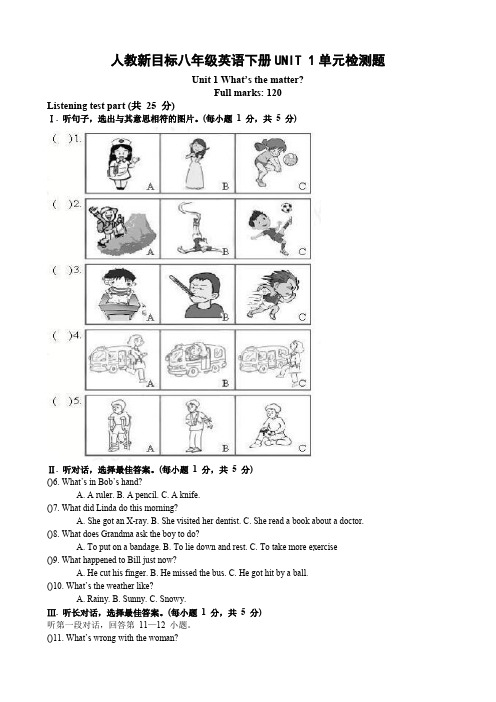
人教新目标八年级英语下册UNIT 1单元检测题Unit 1 What’s the matter?Full marks: 120Listening test part (共25 分)Ⅰ. 听句子,选出与其意思相符的图片。
(每小题 1 分,共 5 分)Ⅱ. 听对话,选择最佳答案。
(每小题 1 分,共 5 分)()6. What’s in Bob’s hand?A. A ruler.B. A pencil.C. A knife.()7. What did Linda do this morning?A. She got an X-ray.B. She visited her dentist.C. She read a book about a doctor. ()8. What does Grandma ask the boy to do?A. To put on a bandage.B. To lie down and rest.C. To take more exercise()9. What happened to Bill just now?A. He cut his finger.B. He missed the bus.C. He got hit by a ball.()10. What’s the weather like?A. Rainy.B. Sunny.C. Snowy.Ⅲ. 听长对话,选择最佳答案。
(每小题 1 分,共5 分)听第一段对话,回答第11—12 小题。
()11. What’s wrong with the woman?A. She has a sore back.B. She has a stomachache.C. She has a headache and coughs.()12. How long was the woman ill?A. For two days.B. For three days.C. For four days.听第二段对话,回答第13—15 小题。
2018春人教新目标八年级英语下册教学课件:Unit1 What`s the matter
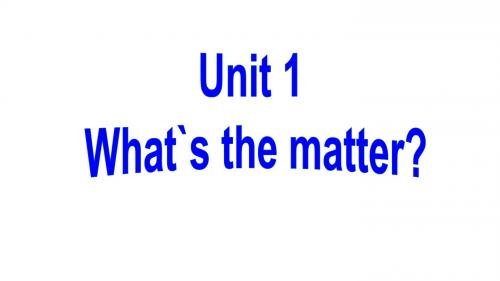
• Self Check 有3个部分:
• 第一部分就本单元的中心话题写出所给身体部分可 能发生的健康问题。
• 第二部分将所给的问句与答语排序成对话,复习了 所学语法知识。
• 第三部分根据所描述的身体不适提出合理建议,是 对词汇和语法的综合运用。
二、教学目标
一、知识与能力 1、掌握本单元所列的四会词汇、重点短语及句型。 2、语法 (1)用英语询问病情和描述身体不适。 (2)should 的用法 。 (3) 反身代词的用法 。 二、过程与方法 1、听:能够听懂目标语言,通过听能获取相关信息并能顺利完成听的任 务。 2、说:能够熟练地运用语言询问病情和描述身体不适并提出适当的建议。 3、读:能够流利地读课文和对话,并运用单元所学的词汇读懂程度相似 的课外读物。 4、 写:能够用本单元的目标语言询问别人的病情,并根据病情提出适当 的建议或描述自己的身体不适。 三、情感态度与价值观 通过本单元的学习,让学生认识到保持身体健康的重要性,并学会如 何关心他人及对病症提出适当的建议。
四、教学重难点
1、询问病情和描述身体不适句型的运用。 2、用情态动词should提出合理建议。 3、 反身代词的用法。
五、教学准备
1、准备与本课相关的实物图片、卡片。 2、准备多媒体课件、计算机、磁带、录音机等。
六、教学安排
分六课时: 第一课时:Section A 1a ----2d 第二课时:Section A 3a-----3c 第三课时:Section A Grammar Focus-----4c 第四课时:Section B 1a------1d 第五课时:Section B 2a -----2e 第六课时:Section B 3a------Self Check
• Section A 有4个部分 第一部分围绕"What's the matter?"这一话题 展开词汇(1a)、听力(1b)和口语(1c)训练。 第二部分围绕“病症及相关的建议”这一话题 进行听力(2a、2b)和口语(2c、2d)两种形式的训练。 第三部分围绕“如何处理事故”这个话题进行 阅读(3a)、配对练习(3b)和思维(3c)训练。 第四部分以语法为主,围绕“如何描述身体不 适及提供意见”这一话题,提供了语法材料 (Grammar Focus),进行语法练习(4a、4b)和语法 (4c)训练。
新版人教版八年下英语Unit1Whatsthematter课文原文

新版人教版八年下英语Unit1Whatsthematter课文原文Unit 1 What’s the matter?1. Mandy:Lisa,are you OK?Lisa:I have a headache and I can’t move my neck.What should I do?Should I take my temperature? Mandy:No,it doesn’t sound like you have a fever.What did you on eht eweekend?Lisa:I played computer games all weekend.Mandy:That’s probably why.You need to take breaks away from the computer.Lisa:Yeah,I think I sat in the same way for too long without moving.Mandy:I think you should lie down and rest.If your head and neck still hurt tomorrow, then go to a doctor.Lisa:OK.Thanks ,Mandy.2.At 9 :00a.m,yesterday,bus No.26 was going along Zhonghua Road when the driver saw an old man lying on the side of the road.A woman next to him was shouting for help.The bus driver ,24-year-old Wang Ping,stopped the bus without thinking twice. He got off and asked the woman what happened.She said that the man had a heart problem and should go to the hospital.Mr. Wang knew he had to act quickly.He told the passengers that he must take the man to the hospital.He expected most or all of the passengers to get off and wait for next bus.But to his surprise,they all agreed to go to with him.Some passengers helped Mr.Wang to move the man onto the bus.Thanks to Mr. Wang and the passengers,the doctors saved the man in time.“It’s sad that many people don’t want to helpothers because they don’t want any trouble,″says one passenger.“But the driver didn’t think about himself.He only t hought about saving a life.″3.He lost His Arm But Is Still ClimbingAron Ralston is an American man w ho is interested in mountain climbing. As a mountain climber, Aron is used to taking risks. This is one of the exciting things about doing dangerous sports. There were many times when Aron almost lost his life because of accidents. On April 26, 2003, he found himself in a very dangerous situation when climbing in Utah.On that day, Aron’s arm was caught under a 360-Kilo rock that fell on him when he was climbing by himself in the mountains. Because he could not free his arm, he stayed there for five days and hoped that someone would find him. But when his water ran out, he knew that he would have to do something to save his own life. He wasn’t ready to die that day. So he used his knife to cut off half his right arm. Then, with his left arm, he bandaged himself so that he wouldn’t lose too much blood. After that, he climbed down the mountain to find help, After losing his arm, he wrote a book called Between a Rock and Hard Place. This means being in a difficult situation that you can’t seem to get out of. In this book, Aron tells of the importance of making good decisions, and of being in control of one’s life. His love for mountain climbing is so great that he kept on climbing mountains even after this experience.Do we have the same spirit as Aron? Let’s think about it before we find ourselves “between a rock and a hard place”, and before we have to make a decision that could mean life or death.。
2018年人教版新目标英语八年级上册

女孩一:你认为水表演的最好?
女孩二:哦,我认为伊莉莎是最好的,她是位杰出的钢琴演奏家。
女孩一:是的,她很棒。而我认为史蒂夫和他的狗是最有意思的。
女孩二:我也这么认为,我忍不住笑出声来了!那么薇拉怎么样?难道她不是很有创造力吗?女孩一:是的,我想她的表演最具创造力!我所了解的能倒立弹吉他的人并不多。
女孩:食物怎么样?
凯文:样样都好吃!
女孩:你有没有遇到些非常有趣的人呢?
凯文:遇到了,我遇到了一些非常有趣的人。
对话三
男孩:xx,你去哪儿度假了?
xx:我一直呆在家里。
男孩:哦,那你做了些有趣的事吗?
xx:不,没有。
男孩:你为测验而学习吗?
xx:是的。
男孩:你和谁出去过吗?
xx:不,没人在这儿。所有人都在度假。
2a&2b(听力)
斯蒂恩女士:好了,现在我想听听大家对未来的预测。
女孩一:额,我认为将会有更多的人。
xx女士:更多人?好,其他人呢?
男孩一:我认为空闲时间会更少。
xx女士:我希望不会。
女孩二:嗯,我认为汽车会更少。
xx女士:是吗?
女孩二:是的,人们将更多地乘地铁。
斯蒂恩女士:那是个好主意。让我们听听另一个预测吧。
Section B1c&1d(听力)
女孩:嗨,莉萨,你周末过得怎样
莉萨:很棒!我和家人去了香港。女孩:真的吗?哇!你做了些特别的事情吗?
莉萨:嗯,我们去了一个有趣的公园,真让人兴奋。
女孩:你去了购物吗?
莉萨:是的,去了。
女孩:商店怎么样?
莉萨:哦,它们都非常贵,不过比我确实买了些东西给我最好的朋友。
比尔:我一周吃三四次。
(完整word版)人教版英语八年级下unit1讲解与练习
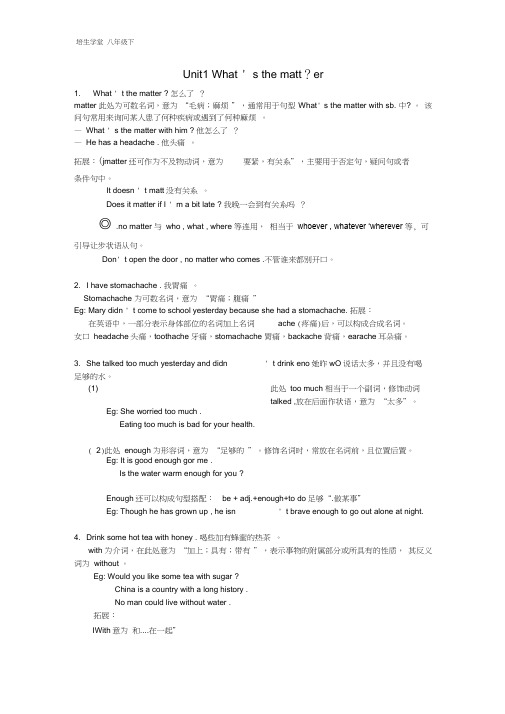
Unit1 What ' s the matt?er1. What ' t the matter ? 怎么了?matter 此处为可数名词,意为“毛病;麻烦”,通常用于句型What' s the matter with sb. 中? 。
该问句常用来询问某人患了何种疾病或遇到了何种麻烦。
—What ' s the matter with him ? 他怎么了?—He has a headache . 他头痛。
拓展:(jmatter还可作为不及物动词,意为要紧,有关系”,主要用于否定句,疑问句或者条件句中。
It doesn ' t matt没有关系。
Does it matter if I ' m a bit late ? 我晚一会到有关系吗?◎.no matter 与who , what , where 等连用,相当于whoever , whatever ‘wherever 等, 可引导让步状语从句。
Don' t open the door , no matter who comes .不管谁来都别开口。
2. I have stomachache . 我胃痛。
Stomachache 为可数名词,意为“胃痛;腹痛”Eg: Mary didn ' t come to school yesterday because she had a stomachache. 拓展:在英语中,一部分表示身体部位的名词加上名词ache (疼痛)后,可以构成合成名词。
女口headache头痛,toothache 牙痛,stomachache 胃痛,backache 背痛,earache耳朵痛。
3. She talked too much yesterday and didn ' t drink eno她昨wO说话太多,并且没有喝足够的水。
(1) 此处too much 相当于一个副词,修饰动词talked ,放在后面作状语,意为“太多”。
最新人教版八年级英语下册 Unit 1 What's the matte 全单元课件
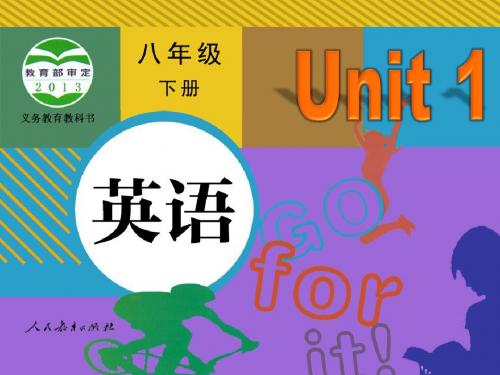
2a Listen and number the pictures [1-5] in the order you hear them.
2
4
3
1
5
2b Listen again. Match the problems with the advice.
1 fever a lie down and rest
What’s the matter with him/her? He /she _________. has a cold
have a cold
have a fever
have a e
have a sore throat
have a stomachache
What’s the matter?
head neck
hand throat arm
stomach
knee
leg
foot
What’s the matter with him/her…?
He has a toothache. She has a toothache.
He has a fever.
She has a fever.
He has a sore throat.
2 stomachache
b drink some hot tea with honey 3 cough and sore throat c see a dentist and get an X-ray 4 toothache d take your temperature
I have a sore throat.
What’s the matter?
I have a stomachache.
人教版英语八年级上册Unit 1 What's the matter Sectiion A Gram
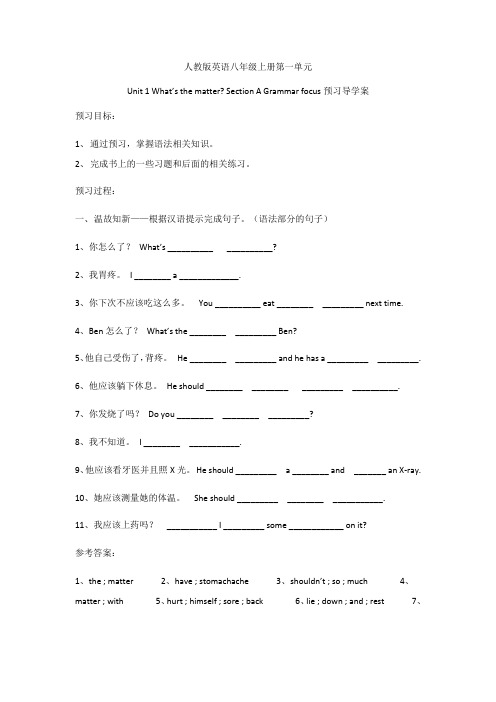
人教版英语八年级上册第一单元Unit 1 What’s the matter? Section A Grammar focus预习导学案预习目标:1、通过预习,掌握语法相关知识。
2、完成书上的一些习题和后面的相关练习。
预习过程:一、温故知新——根据汉语提示完成句子。
(语法部分的句子)1、你怎么了?What’s __________ __________?2、我胃疼。
I ________ a _____________.3、你下次不应该吃这么多。
You __________ eat ________ _________ next time.4、Ben怎么了?What’s the ________ _________ Ben?5、他自己受伤了,背疼。
He ________ _________ and he has a _________ _________.6、他应该躺下休息。
He should ________ ________ _________ __________.7、你发烧了吗?Do you ________ ________ _________?8、我不知道。
I ________ ___________.9、他应该看牙医并且照X光。
He should _________ a ________ and _______ an X-ray.10、她应该测量她的体温。
She should _________ ________ ___________.11、我应该上药吗?___________ I _________ some ____________ on it?参考答案:1、the ; matter2、have ; stomachache3、shouldn’t ; so ; much4、matter ; with5、hurt ; himself ; sore ; back6、lie ; down ; and ; rest7、have ; a ; fever 8、don’t ; know 9. See ; dentist ; get 10、take ; her ; temperature 11、Should ; put ; medicine二、根据课本内容为主线的预习导学。
初二英语(人教版)-Unit 1 What’s the matter?P2-1教案
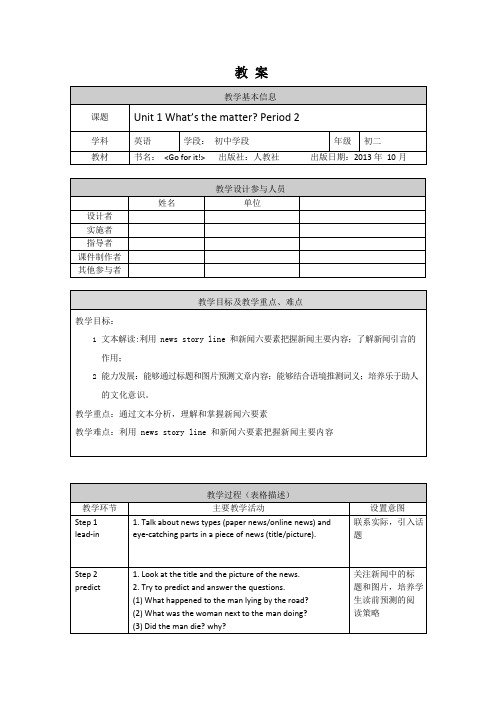
教案新闻有开头简要介绍的,也有用比较吸引人的信息开头的,比如某某人说了一句什么话, 这个之前和老师们讨论过这个时间轴如何命名的问题,之前第一版是根据教参,用的 Step 3read for the first time1. Read paragraph by paragraph and get some specific details.2. Think about the main idea and purpose of each paragraph.3. Analyze “5Ws and 1H” and quotes in the news. 获取文章细节; 分析段落大意和写作目的;关注体裁特点:新闻引言和新闻六 要素Step 4read for the second time Read the whole news and finish the news story line梳理文章脉络,回顾重点语言 Step 5 thinkThink about questions about the text and beyond the text. 1. If you were Wang Ping, what would you do?2. Do you agree that people often do not help othersbecause they do not want to get into trouble? Why or why not?3. What should we do when we see people in need? Why? 引导学生基于文本,联系实际,聚焦文化意识的培养Step 6 interview Listen to other Ss’ opinions about the three questions and teacher’s comments.了解他人观点,拓展相关表达 Step 7read for the third time and focus on the language 1. Read the passage for the third time and underline the words you don’t know.2. Guess the word meanings according to contexts. (1) passenger (n.) (2) to one’s surprise (3) expect (v.) 2. Summarize聚焦语言能力,培养语境意识Step 8 homeworkAssign homework tasks.作业巩固1. 这篇文章似乎并不是典型的英语新闻结构?通常新闻的第一段是梗概,然后细节报道。
unit1what#s the matt

h arm __a_ back __g_ ear __i _ eye b___ foot
__a_ hand _j__ head __l_ leg __c_ mouth ___dneck __m_ nose __k_stomach ___ tooth
---What’s the matter(with you)? ---I have a …….
drink lots of water
A:What’s the matter?=What’s wrong with…? B: I/have….What should I do? A: You should…
backache stomachache have a fever toothache
headache
What’s the matter (with her)? She has a toothache.
What’s the matter(with him) He has a headache.
4
2
3
5
What’s the matter with Nancy?
I have a cold. What should I do?
Have a cold Sore throat
--What should/shouldn’t he do? --I think he should/shouldn’t …
shouldn’t = should not
He
should/shouldn ’t
He has a toothache see a dentist eat ice cream. get an X-ray eat hot food. take some dedicine
新目标初二英语下学期Unit 1 What’s the matte单元检测卷及答案
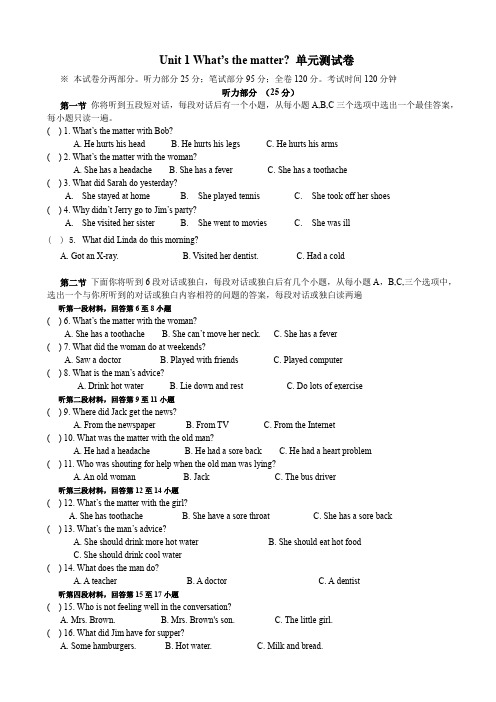
Unit 1 What’s the matter? 单元测试卷※本试卷分两部分。
听力部分25分;笔试部分95分;全卷120分。
考试时间120分钟听力部分(25分)第一节你将听到五段短对话,每段对话后有一个小题,从每小题A,B,C三个选项中选出一个最佳答案,每小题只读一遍。
( ) 1. What’s the matter with Bob?A. He hurts his headB. He hurts his legsC. He hurts his arms( ) 2. What’s the matter with the woman?A. She has a headacheB. She has a feverC. She has a toothache( ) 3. What did Sarah do yesterday?A.She stayed at homeB.She played tennisC.She took off her shoes( ) 4. Why didn’t Jerry go to Jim’s party?A.She visited her sisterB.She went to moviesC.She was ill( ) 5. What did Linda do this morning?A. Got an X-ray.B. Visited her dentist.C. Had a cold第二节下面你将听到6段对话或独白,每段对话或独白后有几个小题,从每小题A,B,C,三个选项中,选出一个与你所听到的对话或独白内容相符的问题的答案,每段对话或独白读两遍听第一段材料,回答第6至8小题( ) 6. What’s the matter with the woman?A. She has a toothacheB. She can’t move her neck.C. She has a fever( ) 7. What did the woman do at weekends?A. Saw a doctorB. Played with friendsC. Played computer( ) 8. What is the man’s advice?A. Drink hot waterB. Lie down and restC. Do lots of exercise听第二段材料,回答第9至11小题( ) 9. Where did Jack get the news?A. From the newspaperB. From TVC. From the Internet( ) 10. What was the matter with the old man?A. He had a headacheB. He had a sore backC. He had a heart problem( ) 11. Who was shouting for help when the old man was lying?A. An old womanB. JackC. The bus driver听第三段材料,回答第12至14小题( ) 12. What’s the matter with the girl?A. She has toothacheB. She have a sore throatC. She has a sore back( ) 13. What’s the man’s advice?A. She should drink more hot waterB. She should eat hot foodC. She should drink cool water( ) 14. What does the man do?A. A teacherB. A doctorC. A dentist听第四段材料,回答第15至17小题( ) 15. Who is not feeling well in the conversation?A. Mrs. Brown.B. Mrs. Brown's son.C. The little girl.( ) 16. What did Jim have for supper?A. Some hamburgers.B. Hot water.C. Milk and bread.( ) 17. Where is Mrs. Brown in the conversation?A. In a hotel.B. At school.C. In a hospital.听第五段材料,回答第18至20小题( ) 18. What’s the matter with Jack?A. He has a coldB. He has a sore backC. He has a cough( ) 19. When did Jack go to the zoo?A. Last Sunday morningB. Last Saturday afternoonC. Last Saturday morning( ) 20. How often did Jack take the medicine?A. Once a dayB. Twice a dayC. Twice a week听第六段材料,回答第21至25小题( ) 21. Where does Mr. Brown work?A. In a school.B. In a hospital.C. In a restaurant.( ) 22. How often should Tom take medicine?A. Three times a day.B. Twice a day.C. Once a day.( ) 23. Who has a cold?A. Alice.B. Bob.C. Mary.( ) 24. What's wrong with Mary?A. She has a cold.B. She has a sore back.C. She has a sore throat.( ) 25. What else should Mary do besides taking medicine?A. Drink hot tea with honey.B. Have a good rest.C. Drink more water.笔试部分(95分)一、单项选择题(15分)( ) 26. —Judy, did you take your________? —Yes, I have a fever. What should I do?A. troubleB. orderC. matterD. temperature( ) 27. It was so cold. Jane was afraid she would get ________ if she stayed here for a long time.A. tiredB. comfortableC. sunburnedD. sick( ) 28.I’m sorry to hear that he cut ______. He should be careful.A. myselfB. himselfC. meD. him( ) 29.Put that knife down — you might ________ someone with it.A. hurtB. pressC. catchD. cover( ) 30. ___his surprise, she succeeded in climbing up the high mountain.A. AtB. OnC. InD. To( ) 31. _____ her husband,she has now become a famous film star.A. BecauseB. Thanks toC. Thanks forD. With the help ( ) 32. We didn't go home ________ the old man was sent to the hospital.A. untilB. whenC. whileD. that( ) 33. We’re talking about “China Dream” these days. It’s ____exciting ___all of the Chinese people are interested in it.A. so; thatB. such; thatC. too; toD. so, to( ) 34. My grandpa is used to ________ a newspaper at the table before breakfast.A. buyB. buyingC. readD. reading( ) 35. He speaks very good English but he knows English people.A. fewB. littleC. a fewD. a little ( ) 36. —I think I’ll drive to Ping yao and see Alice this weekend. —You ________. She misses you a lot.A. willB. mayC. shouldD. need( ) 37. —On my way to school I saw a dog __on the road. —Maybe a car hit it, it’s poor.A. lieB. liesC. layD. lying( ) 38. Maybe I shouldn’t say that — I might get ________ trouble.A. forB. intoC. byD. with( ) 39. As long as they get an idea into their heads, they’ll never ________.A. dress upB. give upC. grow upD. stay up( ) 40. —Joe had a nosebleed in P. E. class. —________ .Did someone hit him on the nose?A. How do you like it?B. What happened?C. I can’t stand it.D. It’s nothing.二、完形填空(15分)Hearing is very important to all of us. We can __(41)__ beautiful music,nice songs of birds,the laughter of people or other different kinds of __(42)__ in the world with our ears.__(43)__ we must try to protect our ears. The following will tell you __(44)__ protect ears.Listening to __(45)__ music a lot can be bad for ears, __(46)__ when headphones (耳机) are used. So try not to wear headphones or __(47)__ the volume (音量) when you're wearing headphones. You should give your ears a rest if you like wearing headphones.Before swimming, remember __(48)_ earplugs (耳塞) into your ears or wear a swim hat to stop water __(49)__ into your ears.If you are going to a concert, wear earplugs to protect your ears __(50)__ the terrible music! __(51)__, special earplugs can be made for you if you go to concerts a lot or if you are a musician yourself.See a doctor if your ears __(52) __. __(53)__ some medicine if the doctor asks you to do so.__(54)__ the advice above now and you won't be saying “What?” when you are getting __(55)__.( ) 41. A. listen B. hear C. listening D. hear of( ) 42.A. sounds B. noise C. voices D. barks( ) 43.A. Because B. Although C. So D. But( ) 44.A. what B. how C. what to D. how to( ) 45. A. loud B. aloud C. loudly D. quiet( ) 46. A. specially B. especially C. special D. especial( ) 47. A. turn on B. turn off C. turn down D. turn up( ) 48. A. put B. to put C. putting D. to putting( ) 49.A. get B. to get C. with getting D. from getting( ) 50.A. for B. from C. with D. at( ) 51.A. In fact B. In short C. In general D. In a word( ) 52. A. break B. hurt C. ill D. sick( ) 53. A. Drink B. Eat C. Take D. Have( ) 54.A. Listen B. Hear C. Follow D. Fetch( ) 55. A. young B. old C. sick D. tired三、阅读理解(30分)AA. shyB. lazyC. strangeD. creative( ) 57. What problem does Jess have?A. She had a fight with her friend.B. She made her friend feel left out.C. She is not good at doing presentations.D. She feels nervous when talking with others.( ) 58. What does the underlined word “awkward” mean in Chinese?A. 奇怪的B. 尴尬的C. 骄傲的D. 激动的( ) 59. Which of the following is TRUE according to the material?A. Rachel did badly in the final exam.B. Karen and Rachel planned a party.C. Marnie’s father is very strict with her.D. Molly and Jess share a lot of hobbies.( ) 60. Where might you read this material?A. In a diary.B. In a storybook.C. In a magazine.D. In a guidebook.BI love to go biking! Two years ago I bought an exercise bike (健身脚踏车). But soon I got bored with being at home, so I bought a used bike and started going for short rides. Now I plan day trips in my neighborhood. When yo u drive a car, you miss many things. It’s surprising how much more you can see when you’re biking.—Maggie My favorite thing to do on the weekend is to go to the beach. The beach is beautiful all through the year. I usually drive there. If the weather is cold, I wear some warm clothes and go for long walks on the beach. When the weather is hot, I enjoy swimming or just lying in the sun.—Barbara On the weekend I like to read books. If the weather is nice, I’ll take a good book to the park and stay there r eading for hours. I think there’s nothing as enjoyable as reading a good book.—Bill Weekends are for going hiking (徒步旅行) with my parents. We live near some beautiful mountains. Sometimes we camp out at night. We really enjoy cooking dinner over a campfire and spending a night under the stars!—Sara ( ) 61. Maggie bought an exercise bike ________.A. one month agoB. two months agoC. one year agoD. two years ago( ) 62. How does Barbara usually go to the beach?A. By bus.B. By car.C. By subway.D. By bike.( ) 63. Bill thinks reading books is ________.A. difficultB. easyC. interestingD. boring( ) 64. On the weekend, Sara likes to go hiking with her ________.A. grandparentsB. parentsC. brothersD. sisters( ) 65. What question may the four children answer?A. What do you like to do on the weekend?B. What do you think of your weekend life?C. Where do you usually go on the weekend?D. Who do you like to spend a weekend with?CLast Friday, I agreed to meet some friends at 6:00 p.m. in a coffee shop. The weather was sunny, so I decided to walk there. I arrived ten minutes early. I ordered a cup of coffee and sat watching people. There were some boys playing football on the street, and a small boy was running after the ball as it rolled (滚) across the road.Suddenly (突然), there came a car. It was going very fast. When the driver saw the boy in his way, he braked (刹车) hard. But it was too late ... The small boy was lying on the stre et without moving. To everyone’s surprise, the car didn’t stop. It drove away quickly.People ran to the boy. There was a cut on the boy’s head and he lost a lot of blood. The coffee shop owner (主人) telephoned the police. Soon an ambulance (救护车) arrived and took the boy to the hospital.At 6:30 p.m., the police arrived and started questioning people. About half an hour later, they asked me to go to the police station because I saw everything. I gave them all the information I knew because I really wanted them to catch the driver. I didn’t leave the police station until 8:00 p.m. After that I went home because I didn’t feel like talking to anyone.The next day, the boy’s parents called me to say thanks. They also told me their boy was fine and the driver was in the police station now.( ) 66. Where was the writer at 5:50 p.m. last Friday?A. At home.B. On the street.C. In a coffee shop.D. In the police station.( ) 67. Who called the police?A. The writer.B. The boy’s friends.C. The boy’s parents.D. The coffee shop owner.( ) 68. The writer left the police station at ________ p.m.A. 6:30B. 7:00C. 7:30D. 8:00( ) 69. Which is the right order of the following events?① The writer ordered a cup of coffee. ②There was a cut on the boy’s head.③ A car came very fast. ④The writer got a call from the boy’s parents.⑤ The writer went back home.A. ①②⑤③④B. ①③②⑤④C. ③②①⑤④D. ③①②④⑤( ) 70. How might the writer feel at the end of the story?A. Happy.B. Tired.C. Worried.D. Popular.四、综合填词根据音标、汉语意思、所给单词或句子意思在横线上填上合适的单词(6分)71. In hospital the ________ helped me so much. I must give thanks to them..([nɜːs])72. We villagers built that bridge by ________ (we). We had no help from anyone else73. After I heard the news of my dog’s ________, I felt sad. (die)74. He ________ (躺) down on the sofa and soon fell asleep.75. How many ________ (乘客) are there on the bus?76. He stopped the bus ________ thinking twice and saved the old man五、选词填空,从方框中选择合适的单词填入文中空位处,每词用一次(有两个词是多余的)(6分)Do you know an American man called Aron Ralston? He is a mountain (77)________. He is interested in climbing. He is used to (78)_________ risks.On April 26,2003, when he climbed the mountains in Utah, he was caught (79)________ a big rock. He couldn ’t move his right arm for three days and he (80)_________ out of water. To save his life, he used his knife to cut off half his right arm and climbed down the mountain to find help. At last, he saved (81)_________.After that, he kept on climbing mountains and (82)_________ gave up his love for climbing.六、任务型阅读 阅读短文,按要求完成所给任务(8分)Annie lived alone in Chicago. One day, she fell down in her bedroom and broke her leg. So she tried to call her friend Lisa. (1). The call reached Taylor, an 18-year-old girl. She was a college student and she lived hundreds of miles away from Chicago.At that time Taylor was reading in bed. She thought it was somebody playing a joke. When she was going to put down the phone, she heard a woman saying, “Help! Help!” From it Taylor thought something bad must havehappened to the woman. After she got the woman’s name and address, Taylor called 911 at once. (2). She spoke to Annie on the phone till the doctors arrived at Annie’s house. At last Annie was taken to the hospital in time. As soon as Annie felt better, she wrote a letter to Taylor to thank her.任务一:从方框中选出能填入文中(1)和(2)处的最佳选项任务二:将文中划线句子译成中文_______________________________________________________任务三:Why did Annie write the letter to Taylor?_______________________________________________________七、书面表达 (15分)在中国学习的英国交换生吉尔(Jill)近期总是头痛,她到医院诊治多次但效果不佳。
八年级英语What’sthematter第1课时SectionA1a_2d导学案新版人教新目标版

Unit 1 What’s the matter第一课时Section A(1a~2d)【学习目标】1.学生能听说读写本课时的重点单词和词组。
2.学生能听懂谈论健康问题的对话,能根据别人的健康问题提建议。
3.学生会运用情态动词should来提出建议,关心他人的身体健康。
【学习重点】掌握情态动词should/shouldn't的用法。
【学习难点】能询问并表述身体的种种不适以及对他人身体的种种不适给予适当的建议。
情境导入T:Hello,everyone!Welcome back to school.After the Spring Festival,you all look well.Are you OK?通过春节后师生重逢的相互问候引入健康话题。
再向学生提问:T:But if we are ill,what should we do?S:We should go to a doctor.自学Task 1【组内小展示】先由各小组组长带领组内成员认读单词和词组,再在整个小组内进行齐读后对词汇的用法进行归纳,并标记出发音和理解困难的单词,可及时向老师求助。
最后,板书展示内容。
【班级大展示】1.I can read.(我会读)①带读——齐读,注意accident,situation,importance,decision等的发音;②通过游戏形式,如单词游戏来巩固单词的学习。
2.I can write.(我会写)①以answer quickly(抢答)的方式对词组进行中英互译;②带读——齐读;③抽测:可以用造句的方式巩固词组的用法。
3.I can summarize.(我会总结)①结合I can write中的单词,总结归纳询问病情及其回答的用法;②抽测:用【小试牛刀】中的练习对询问病情的用法进行巩固,并以抢答的方式对答案进行核对,并进行讲解。
情景导入生成问题1.(T)Question:Are you OK?What should we do to keep healthy?(S)Answer:________________________________________________________________________2.(T)Question:But if we are ill,what should we do?(S)Answer:________________________________________________________________________自学互研生成能力Task 1Let's read the new words and phrases.1.I can read.(我会读)matter,sore,throat,stomachache,foot,neck,stomach,fever,lie,rest,Xray,toothache,headache,cough2.I can write.(我会写)(1)What's the matter? 怎么了?__ (2)have a very sore throat 喉咙很痛(3)talk too much 说话太多 (4)lie down and rest 躺下休息(5)drink some hot tea with honey 喝一些带蜂蜜的热茶(6)see a dentist 看牙医(7)get an Xray 拍X光(8)take one's temperature 量体温 (9)cut oneself 割伤自己(10)put some medicine on it 在上面敷药(11)have a fever 发烧 (12)have a headache 头痛(13)sound like 听起来像 (14)on the weekend 在周末(15)play computer games 玩电脑游戏 (16)all weekend 整个周末(17)take breaks 休息 (18)go to a doctor 看医生3.I can summarize.(我会总结)(1)What's the matter?这是人们,特别是医生和护士,询问病人病情时最常用的句型,意思是“怎么了?”其后通常与介词 with 连用。
(2021年整理)2018年八年级英语下Unit1what`sthematter精编练习(有答案)

2018年八年级英语下Unit1what`sthematter精编练习(有答案)编辑整理:尊敬的读者朋友们:这里是精品文档编辑中心,本文档内容是由我和我的同事精心编辑整理后发布的,发布之前我们对文中内容进行仔细校对,但是难免会有疏漏的地方,但是任然希望(2018年八年级英语下Unit1what`sthematter精编练习(有答案))的内容能够给您的工作和学习带来便利。
同时也真诚的希望收到您的建议和反馈,这将是我们进步的源泉,前进的动力。
本文可编辑可修改,如果觉得对您有帮助请收藏以便随时查阅,最后祝您生活愉快业绩进步,以下为2018年八年级英语下Unit1what`sthematter精编练习(有答案)的全部内容。
2018年八年级英语下Unit1 what`s the matter精编练习(有答案)Unit 1 what`s the matter?(含答案) 第一课时 Section A (1a—-1d) I。
根据句意及首字母或汉语提示完成单词 1.Don`t get stressed out,You should listen to some music and r________ 2。
Dongdong has as____________。
He can`t eat anything for 24 hours。
3.He can`t speak well. he ha a sore t_______________. 4。
I have a t__________。
I have to see a dentist I`m not feeling well. I have a f____________.6.I think you should take your t_______________ 7。
I don`t feel well。
I have a h______________。
8。
Look! There is a ring around the dog`s n___________。
- 1、下载文档前请自行甄别文档内容的完整性,平台不提供额外的编辑、内容补充、找答案等附加服务。
- 2、"仅部分预览"的文档,不可在线预览部分如存在完整性等问题,可反馈申请退款(可完整预览的文档不适用该条件!)。
- 3、如文档侵犯您的权益,请联系客服反馈,我们会尽快为您处理(人工客服工作时间:9:00-18:30)。
Unit 1 What’s the matter?Period 1 Section A (1a-2c)Before class: Listen to an English song.Step 1 Warming-up and check what students have learned before class.1. Greet.T: This song is about our bodies. This class , we‟ll talk about something about our bodies—unit 1 together, go. Unit 1 What‟s the matter?2. We have learned the words before class.Present a picture of a girl . Look at the girl. How many...Now, all the No. 3 and No. 4 stand up ,say the words one by one .You can get two marks for each word.4. Work on Section A 1a students say one by one.Look at 1a. Before class, have you finished1a? Let‟s say the answers like this.T:Good job. You are very careful.Step 2 Presentation .1. Just now , we know the words about our bodies . But sometimes our body may get ill. Howdo we ask and answer about illness?Let‟s watch a video. Follow it and do some actions.From the video. We know we can ask “what‟s the matter with you?”and you can answer “I have a ...”.2.T: We also know some illnesses. Here are the new words about the illnesses. Let’s learn ingroup.A.Demonstrate :No 1 read the sentences one by one. The others follow him/ her. When you read ,please do some actions like me.Let me see which group read best and act best.B. Study in groups.C. Find the rules.D. Group report. Stop studying, look at these words , what can you find?You are good at thinking.Step 3 Guessing game:Have you remember the words? Let‟s play a guessing game. No 6 come here.quickly. You each act an action. (边说边发纸条)Each group have chances toguess the illness. The others answer like this: “He /She has a...”Step 4 Work on 1b.1. T: Now, you know some illnesses . Look at the picture .These students ger ill. Show thepictures one by one and ask.What are their names? Let‟s do 1b.How do we do it? For example, we‟ll hear Sarah has a cold, and No 1 has a cold , so write 1 behind Sarah. What about 2, 3, 4 and 5? When you hear the illnesses , write their numbers behind the names.2. Listen.3. Check the answers.Step 5 Group work.1. T: Why do they get ill? Look at the chart, match the reasons with the illnesses.2. Check the answers.3. Demonstrate .Look at the chart. Let‟s talk about their illnesses in pairs. Here is the example.Boys ask , girls answer.4. Look at the chart and make more similar conversations.When you talk , please talk loudly, correctly and politely, please do some actions and use the nice intonations.5. Let students show their conversations.Step 6 Work on 2a and 2b.1. T: David has a stomachache, what should he do?Show the pictures ,ask and answer. 板书What should …do? …should….T: Your advice is very useful. Let‟s learn more advice from 2a and 2b.2. Listen, finish 2a. What‟s the matter with the people? What advice do they get?3. First , guess the answers to 2b. Then listen and check the answers.OK, you have good listening skills.Step 7 Group work.The advice for illness is very useful . It can help us take good care of ourselves and others.T: If some students are ill, will you give some advice and help them? let‟s act andmake conversations. Let me see who is the kind person? How do we talk?Look at the example.2. Show the example.When you talk , please talk loudly, correctly and politely, please do some actions and use the nice intonations.3. Students work.4. Let students show their conversations.Step 8 Summarize and homework:Period 2 Section A 2d,GrammarKnowledge aims:1. The students will be able to learn the words and phrases: take breaks, hurt,2.Summarize the grammar and practice them.3. Target Language:①What‟s the matter with Ben? –He hurt himself./ He has a sore back.②-Do you have a fever? -Yes, I do./ No, I don‟t.③-Does he have a toothache? -Yes, he does.④You shouldn‟t eat so much next time.⑤What should she do?⑥She should take her temperature.⑦-Should I put some medicine on it? -Yes, you should. / No, you shouldn‟t.Structure: ①“should/ shouldn‟t + verb” for suggestion ②Reflexive pronouns. Ability Object:1.Enable students to talk more about health.2.Learn to give others some advice according to their matters.3.Enable the students to do things using the target language and the grammar. Emotion Object:1.Learn to live in a healthy way.2. Learn to take care of others and themselves.Teaching Key Points:1. How to teach the Ss to learn the names of the illness: toothache, fever andheadache.2. How to give others some advice according to their matters.3. The grammar.Teaching Difficult Points:1.How to give advice using should.2. Use the grammar to do things.Teaching Procedures:Step 1 Review.1. Free-talk. What …s the weather like today? If you don‟t wear warm clothes,what will happen?2.Show the pictures and say.He / She has_______________. He /She should___________.Step 2 Work on 2d.1. Game.Do in the same way2. Listen to the conversation and answer my questions .1). What's the matter with Lisa?2). What did Lisa do on the weekend?3). What should Lisa do ?3. Role-play the conversation.First, have students to role-play the conversation in 2d in groups and choose the best.Step 3 Group work.1. Give more examples. Have students read the conversation in 4c.2. and then ask them to work in groups. One student mimes a problem. The otherstudents in his/ her group guess the problem and give their advice.Step 4 Grammar Focus .Have students to read and remember the sentences of Grammar Focus by themselves, and then have them work in groups to sum up how to talk about health problems and give right advice.Step5 Work on 4a.Ask students to go through each conversation in 4a quickly, and then complete the conversations individually. Move around the classroom and help them ifnecessary.Check the answers.Ask some students to practice every conversation in pairs.Step 6 Work on 4b.Have students choose and circle best advice for the health problems in 4b. Then ask students add their own advice about these health problems.Have some students to report their own advice in class.Step 7 Summary.Health problems and give right advice.Ask one or two students to sum up the key phrases in the passage, and help them to make up more sentences with them.Step 8 Homework .Have students make up conversations to talk about sb.‟s health problems and give them some advice.Period 3 Section A 3aKnowledge aims:The students will be able to learn the words and phrases: passenger, get off, to one‟s surprise, onto, trouble, hit, right away, get into.2.The students will be able to use the expressions:The driver didn‟t think about thinking about himself. He only thought about saving a life. Ability aims:The students can understand the passage.2.To train the students‟ cooperation with their partners.Emotional aims:To train the students to care about others and help others who are on trouble..Teaching important points:The students can understand the passage and use the useful expressions freely.Teaching difficult points:The students can learn from the drivers and do as the driver does if possible.Teaching procedures:Step 1 Warming-up and lead-in.1. Watch a video.2. What is the short sketch about?3.Look at the picture. What can you see? Can you guess what is happening?Step 2 Preparing reading.1. Guess the main idea.What is this passage mainly about?Strategy : The title and pictures can be helpful to understand the text.Title may be the main meaning of the article.2. Read the passage. Do you think it comes from a newspaper or a book?Step 3 While-reading.1.Find the topic sentence(中心句)of each paragraph.1). At 9:00 a.m. yesterday, bus No. 26 was going along Zhanghua Road when the driver sawan old man lying on the side of the road.2). Some passengers helped Mr. Wang to move the man onto the bus.3). Thanks to Mr. Wang and the passengers, the doctors saved the man in time.2. Which sentences touched you? Read them in the way that you like.Step 4 Post-reading.1. Praise the persons.What a great person the driver was!He stopped the bus without thinking twice, when he saw an old man lying on the side of the road.What _______ the _____ was/were!2. Work on 3bAfter checking the answers, have Ss scan the passage and check (√) the things that happened in the story.3. Work on 3c.T: Ask the students to discuss the questions in pairs.Step5 Homework.1. If you are the driver, write a diary about what happened yesterday.2. If you are the passenger, write a diary about what happened yesterday.3. Act the story out in your group.4. Read some messages about good men.Period 4 Section B 1a-1dStep 1 Lead –in and learn the new words.It‟s a beautiful song, I like it very much. Let‟s learn the new words.1. Who can be the teacher? One student teach one word.2. Let’s sing and remember the new words.The teacher teaches to sing, ask some group to sing. Finally sing together.(可以课前教唱,。
